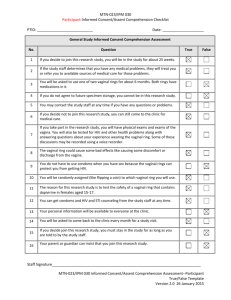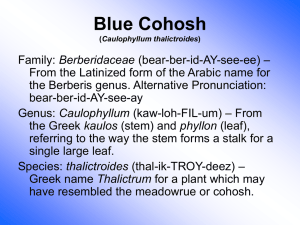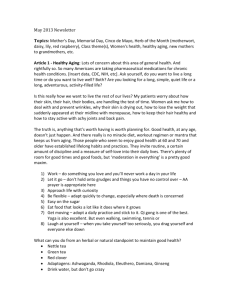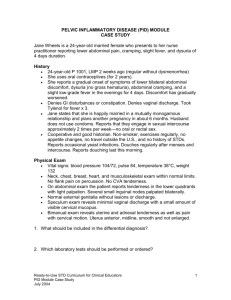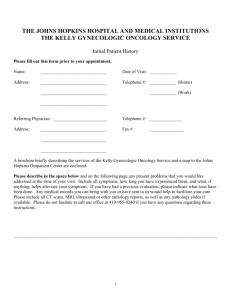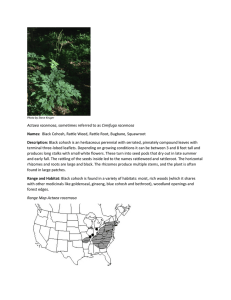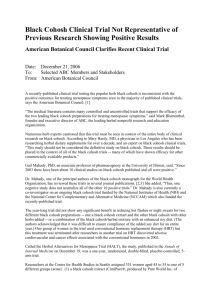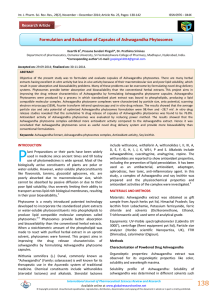DOC - Foundations In Herbal Medicine
advertisement
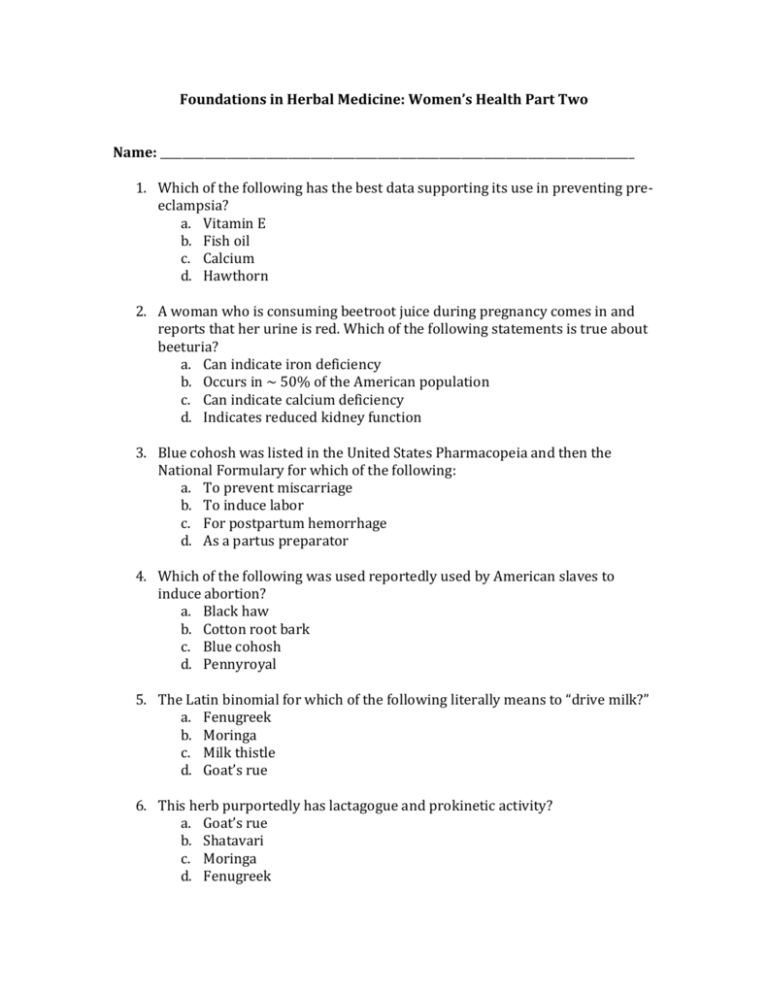
Foundations in Herbal Medicine: Women’s Health Part Two Name: _____________________________________________________________________________________ 1. Which of the following has the best data supporting its use in preventing preeclampsia? a. Vitamin E b. Fish oil c. Calcium d. Hawthorn 2. A woman who is consuming beetroot juice during pregnancy comes in and reports that her urine is red. Which of the following statements is true about beeturia? a. Can indicate iron deficiency b. Occurs in ~ 50% of the American population c. Can indicate calcium deficiency d. Indicates reduced kidney function 3. Blue cohosh was listed in the United States Pharmacopeia and then the National Formulary for which of the following: a. To prevent miscarriage b. To induce labor c. For postpartum hemorrhage d. As a partus preparator 4. Which of the following was used reportedly used by American slaves to induce abortion? a. Black haw b. Cotton root bark c. Blue cohosh d. Pennyroyal 5. The Latin binomial for which of the following literally means to “drive milk?” a. Fenugreek b. Moringa c. Milk thistle d. Goat’s rue 6. This herb purportedly has lactagogue and prokinetic activity? a. Goat’s rue b. Shatavari c. Moringa d. Fenugreek 7. The green pods and leaves of this tree are often used to combat nutrition in pregnant and nursing women. It may have lactagogue effects, as well. a. Moringa b. Nettle c. Maca d. Fenugreek 8. This tincture is often used to relieve thrush in Europe and is approved by the German health authorities as a topical treatment for inflammation of the oral and pharyngeal mucosa. a. Goldenseal b. Aloe vera c. Tea tree d. Myrrh 9. A 27-year old non-pregnant woman with her third vaginal infection has a vaginal pH less than 4.5, white discharge and vaginal burning. On wet mount, no clue clues, very few white cells. Which of the following would be MOST effective? a. Vaginal probiotics b. Oral goldenseal c. Vaginal boric acid d. Oral myrrh 10. You have 4 ounces of fixed carrier oil and want to make a 2% essential oil preparation. How many drops would you use? a. 20 drops b. 48 drops c. 64 drops d. 96 drops 11. In a woman refusing antibiotics, which of the following has the most evidence for treating bacterial vaginosis? a. Vaginal probiotics b. Vaginal tea tree oil c. Vaginal boric acid d. Vaginal goldenseal 12. Which of the following was shown to reduce outbreaks of oral and genital herpes when taken orally? a. Aloe vera b. Sage c. St. John’s wort d. Lemon balm 13. Which of the following adaptogens might be useful for someone with genital herpes? a. Reishi b. Ginseng c. Shatavari d. Eleuthero 14. This herb is often used to reduce hyperhidrosis and hot flashes. It may also have beneficial effects on cognition and can even relieve a sore throat! a. Black cohosh b. St. John’s wort c. Chaste berry d. Sage 15. For women with irregular menstrual cycles during the perimenopause, this herb may serve to regulate them. It is more widely used for PMS. a. Black cohosh b. St. John’s wort c. Chaste berry d. Sage 16. In Traditional Chinese Medicine, estrogen is considered to be which of the following? a. Yin b. Yang 17. This hormone and route of administration is associated with increased risk of blood clots. a. Oral progesterone b. Transdermal estrogen c. Oral estrogen d. Transdermal progesterone 18. Which of the following have been shown beneficial for menopause symptoms? a. Acupuncture b. Hypnosis c. Mindfulness meditation d. All of the above 19. This herb is considered a cool, moistening herb. a. Rhodiola b. Schisandra c. Ashwagandha d. Kava 20. Which of the following is most associated with improving cognition and memory? a. Ashwagandha b. Shatavari c. Bacopa d. Ginseng 21. Sage essential oil contains this compound that could be toxic to the brain, liver and kidney. a. Pyrrolizidine alkaloids b. Thujone c. Rosmarinic acid d. Absinthe 22. Maca has been found to exert which of the following activities? a. Anti-depressant b. Hypotensive c. Aphrodisiac d. A and C only e. All of the above 23. This herb has prokinetic and adaptogenic activity. It is said to pacify pitta. a. Schisandra b. Ashwagandha c. Shatavari d. Black cohosh 24. This herbal aphrodisiac was a favorite of the Mayans and the indigenous peoples of northern Mexico. a. Damiana b. Maca c. Sage d. Wild yam 25. This nervine/hypnotic contains a phytoestrogen compound that binds ERalpha. a. California poppy b. Black cohosh c. Sage d. Hops 26. Compounds from this herb led to the development of biguanide drugs (e.g., metformin). a. Shatavari b. Milk thistle c. Fennel d. Goat’s rue 27. This herb is widely used by herbalists at the first signs of mastitis in a nursing mother? a. Goldenseal b. Echinacea c. Myrrh d. Calendula 28. Which of the following is beneficial for herpes simplex virus? a. Oral aloe vera gel b. Topical sage/rhubarb c. Oral licorice d. All of the above 29. Which of the following are active against Candida species, bacterial vaginosis, and trichomoniasis (basic science or clinical research)? a. Berberine b. Tea tree oil c. Boric acid d. All of the above 30. What herb most fascinated you during this module? Why? How might you use it?
